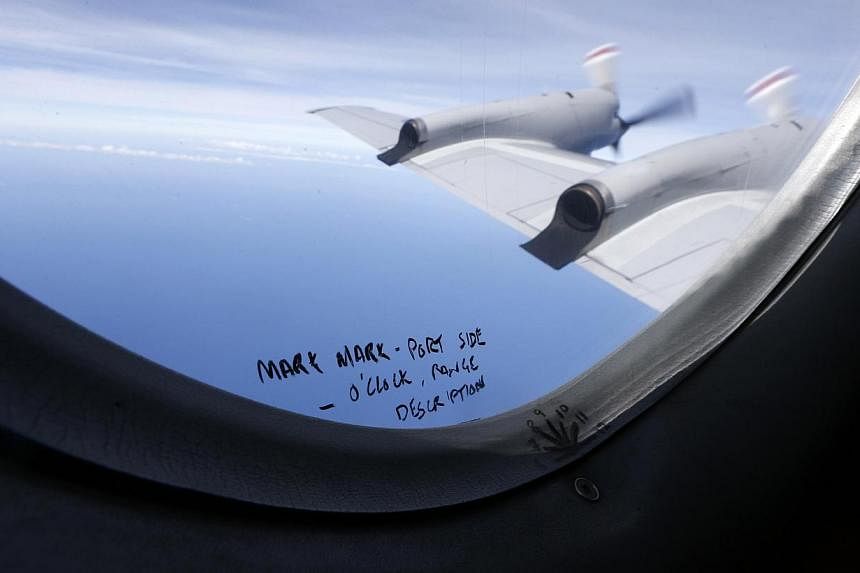SYDNEY (AFP) - Australian Prime Minister Tony Abbott on Thursday expressed hope that missing flight MH370 will be found, but suggested the search may be scaled back as he marked one year since it vanished.
The Malaysia Airlines plane disappeared en route from Kuala Lumpur to Beijing on March 8, 2014 with 239 people on board. No trace has been found despite a massive surface and underwater hunt.
"I do reassure the families of our hope and expectation that the ongoing search will succeed," Mr Abbott told Parliament in Canberra. "I can't promise that the search will go on at this intensity forever but we will continue our very best efforts to resolve this mystery and provide some answers."
Australia is leading the hunt in the Indian Ocean some 1,600km off its west coast, with four ships using sophisticated sonar systems to scour a huge underwater area.
The vessels are focusing on a 60,000 sq km priority zone, with the search scheduled to end in May. More than 40 per cent of the ocean floor has been explored to date.
The intensive search - jointly funded by Australia and Malaysia with a budget of A$120 million (S$128.2 million) - has so far only turned up a few shipping containers.
The ships, Fugro Supporter, Fugro Equator, Fugro Discovery and GO Phoenix, are working in one of the world's most isolated locations in treacherous conditions similar to the "Roaring Forties" north of Antarctica - notorious among mariners for its hostile seas.
Weather conditions in the remote region are expected to worsen after May.
The agency coordinating the search, the Australian Transport Safety Bureau, has previously said a decision on continuing after the current hunt was completed was up to the Australian and Malaysian governments.
The high costs meant the ships' crews were highly focused.
"It's a very expensive search. We want to make sure that when we run over (a possible debris field), we know we don't miss it by accident," Fugro's MH370 search head Paul Kennedy said on Thursday.
"Because we'll never go back there again. It's a one-shot deal."
The families of some of the Australian victims were in parliament when Mr Abbott made his statement, as was Malaysian High Commissioner Zainal Abidin Ahmad, Chinese ambassador Ma Zhaoxu and representatives of other nations that lost citizens.
"The message of this Parliament to all of the families of MH370 is that you remain in our thoughts and prayers," the Australian leader said.
"To you - and to all those with loved ones aboard that flight - my pledge is that we are taking every reasonable step to bring your uncertainty to an end."
Many relatives were incensed when on January 29 Malaysia declared that all on board were presumed dead and that families should seek compensation.
Next of kin fear the move means the Malaysian government and airline could declare the matter closed without any resolution.
Abbott thanked the countries involved in the hunt over the past year in what he described as the "biggest search operation of its kind in history".
He said the plane's disappearance "demonstrated a fundamental gap in tracking long-haul flights, particularly over the oceans".
Australia, Malaysia and Indonesia plan to trial a "world first" system that increases the tracking of aircraft over remote oceans to a minimum rate of every 15 minutes from current intervals of 30 to 40 minutes.
"While it is not a complete answer, it will deliver immediate improvements in the way we track aircraft while more comprehensive solutions are developed and implemented," Mr Abbott said of the system, announced on Sunday.
"We must ensure that no families will ever again have to endure the suffering of the families of the MH370 passengers."
Australia last week also said it would partner with French industrial giant Thales to develop a "world first" joint civilian-military air traffic control system that could help track MH370-type incidents "more quickly and more precisely".
Mr Abbott added that the plane's disappearance "demonstrated a fundamental gap in tracking long-haul flights, particularly over the oceans".
The agency coordinating the search, the Australian Transport Safety Bureau, has previously said a decision on continuing after the current hunt was completed was up to the Australian and Malaysian governments.

